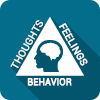- The History of CBT
- Treating Depression
Video: Cognitive Behavioral Therapy Explained
The History of CBT
Modern cognitive behavioral therapy (CBT) was developed independently by two separate individuals: Aaron Beck, a psychiatrist, and Albert Ellis, a clinical psychologist.
Both Beck and Ellis began working on their versions of the therapy in and around the late 1950s and early 60s.
Both versions of the therapy are founded on the single basic idea that cognition, in the form of thoughts and preconceived judgments, precedes and determines people's emotional responses.
In other words, what people think about an event that has occurred determines how they will feel about that event.
Treating Depression
Depression happens because people develop a disposition to view situations and circumstances in habitually negative and biased ways, leading them to habitually experience negative feelings and emotions as a result.
Cognitive behavioral therapists suggest that:
- Depression is caused by a combination of an unhelpful dysfunctional thought process and by maladaptive behaviors motivated by that thought process.
- Because these dysfunctional thoughts and behaviors are learned, people with depression can also learn new, more adaptive skills that raise their mood and increase their ability to cope with daily hassles and stressors.
Therefore, if a person changes their thoughts and behavior, a positive change in mood will follow.
Core Beliefs
Core beliefs are fundamental assumptions people have made that influence how they view the world and themselves. People get so used to thinking in these core ways that they stop noticing them or questioning them.

Simply put, core beliefs are the unquestioned background themes that govern depressed people's perceptions. For example, a depressed person might think "I am unlovable" or "I am inadequate and inferior" and because these beliefs are unquestioned, they are acted upon as though they are real and true.
Core beliefs serve as a filter through which people see the world. Core beliefs influence the development of "intermediate beliefs," which are related attitudes, rules and assumptions that follow from core beliefs.

When depressed people's core beliefs are negative and unrealistic, they lead people to experience predominately negative and unrealistic thoughts. Following along with the example started above, our depressed person might develop the attitude that, "It's terrible to be unloved." Similarly, the intermediate belief might include the following rule, "I must please everyone" and an assumption to the effect that, "If I please everyone then people will love me."
Therapists are Standing By to Treat Your Depression, Anxiety or Other Mental Health Needs
Explore Your Options Today
Ad
The cognitive aspect of CBT involves learning to identify these distorted patterns of thinking and forming judgments.
Intermediate Beliefs
Intermediate beliefs can influence people's view of a particular situation by generating "automatic thoughts," the actual thoughts or images that people experience flitting through their minds.
- Automatic thoughts are evaluative cognitions which occur in response to a particular situation. They are spontaneous (hence the term automatic), rather than the result of deliberate extended thinking or the logical reasoning that occurs when someone concentrates.
- Automatic thoughts occur effortlessly, more or less all the time. Most of the time we are unaware that they are occurring, not because they are unconscious sorts of things but rather because we're so used to them that we don't notice them anymore. Automatic thoughts influence emotions and behaviors and can provoke physiological responses.
To continue the above example, if a friend of our depressed person does not return a phone call, our depressed person might think, "He's not calling me back because he hates me."
- It may never occur to her to generate alternative and less irrational explanations for the lack of a callback such as, "He must be really busy today."
Because the automatic thought "he hates me" is allowed to stand unchallenged, our depressed person starts feeling hated, and thus depressed.
Though every patient's automatic thoughts are unique, there are also clear patterns of depressive automatic thoughts that form that are common across many depressed people's minds. Some common patterns of negative and irrational automatic thoughts include:
- Catastrophizing - always anticipating the worst possible outcome to occur (e.g., expecting to be criticized or fired when the boss calls).
- Filtering - exaggerating the negative and minimizing the positive aspects of an experience (e.g., focusing on all the extra work that went into a promotion rather than on how nice it is to have the promotion).
- Personalizing - automatically accepting blame when something bad occurs even when you had nothing to do with the cause of the negative event (e.g., He didn't return my phone call because I am a terrible friend or a boring person; I caused him to not call.).
- (Over)Generalizing - viewing isolated troubling events as evidence that all following events will become troubled (e.g., having one bad day means that the entire week is ruined).
- Polarizing - viewing situations in black or white (all bad or all good) terms rather than looking for the shades of gray (e.g., "I missed two questions on my exam, therefore I am stupid", instead of "I need to study harder next time, but hey - I did pretty good anyway!").
- Emotionalizing - allowing feelings about an event to override logical evaluation of the events that occurred during the event. (e.g., I feel so stupid that it's obvious that I'm a stupid person).
Dysfunctional Beliefs
Dysfunctional beliefs are thinking habits that people learn which happen to be irrational and not based on reality (e.g., on objective, unbiased observation). Because such beliefs are not linked to reality very well, they tend to appear rather distorted when compared with reality.
Distorted though they may be, dysfunctional beliefs are all people typically have to help them make sense out of the events that happen to them. Snap judgments are made (called Cognitive Appraisals) based on the assumptions present within dysfunctional beliefs, and those judgments end up being, not surprisingly, biased and irrational.
People look to their appraisals of stressful situations to know how to react, and when they do, they see that situations look simply awful (worse than it really would appear if some reality testing were to occur). They react to that false or exaggerated sense of awfulness and correspondingly, experience depressive symptoms.
As advocates of mental health and wellness, we take great pride in educating our readers on the various online therapy providers available. MentalHelp has partnered with several thought leaders in the mental health and wellness space, so we can help you make informed decisions on your wellness journey. MentalHelp may receive marketing compensation from these companies should you choose to use their services.
MentalHelp may receive marketing compensation from the above-listed companies should you choose to use their services.
Ad
